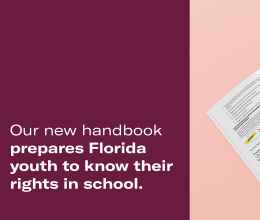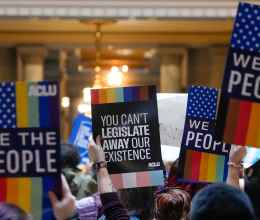If you are a public school student in Florida, you have rights. This handbook tells you about those rights, when you can use them, and when school officials and police can limit them. This handbook does not offer legal advice. Please use this as a reference for general information regarding your rights at school, and refer to your Student Handbook for your school’s policies.
If you think your rights are being violated, contact us at www.aclufl.org.
Constitutional rights do not end at the schoolhouse doors. The law can be complex and vague, especially with regards to the rights of young people, but students and teens should know their rights!
Our We Have Rights Student Handbook was developed to help educate Florida’s youth, their families and mentors on youth rights. This handbook does not offer legal advice and is not a substitute for consulting an attorney.
Our Student Know Your Rights Handbook is a guide that includes critical information for young people about their rights. Topics include:
- Young people’s rights when interacting with police;
- Students First Amendment rights in school;
- Teen health and the law;
- How to file complaints of discrimination, bullying or other harassment in a school;
- Students rights to due process when being disciplined;
- And more.
What the ACLU Believes
-
The ACLU of Florida believes that all schools should treat students with respect, and that school rules should be reasonable and consistent with fundamental American values.
-
We believe that students should be free to express themselves as long as they do not threaten or intimidate others.
-
We believe that schools should set a standard for reasonable, age-appropriate responses to student conflicts that promotes individual development and supports healthy school climates.
-
We believe that school rules should be enforced fairly and consistently, with no student singled out, picked on, or favored.
-
We believe that rules should be directly related to education and have an educational purpose. We believe that students’ behavior during off-school hours and away from school is none of the school’s business.
-
We believe that schools should adopt evidence-based discipline that helps young people grow instead of punishment that makes their lives harder. Such discipline may include restorative circles to help youth understand how their behavior impacts others, conflict resolution education to give youth the tools they need to navigate conflict and collaborative problem solving that involves youth in identifying and addressing their unmet needs
Many of the ACLU’s beliefs are not reflected by current law, and there are many beliefs we have that courts may not accept. The ACLU’s beliefs may someday be the law in Florida—issues that you, as students, bring to us may help us shape the law for future students.
Your Constitutional Rights (and why you should care)
Getting an education isn’t just about books and grades; you’re learning how to participate fully in the life of this nation. To really participate, though, you need to know your rights. Knowing your rights is the first step in asserting them.
The Bill of Rights includes ten amendments to the U.S. Constitution that were created to protect the rights and liberties of everyone in the United States, to give each individual the freedom to live as he or she chooses, free from government control or interference.
Where does that leave students?
Over decades, judges and Supreme Court justices have arrived at a range of different answers, resulting in a patchwork of laws that loosely define the rights of students in public schools. Some schools have responded to the violent and tragic incidents at Columbine High School in 1999 and at Sandy Hook Elementary School in 2012 by cracking down on students’ rights and taking a “guilty until proven innocent” approach to discipline. Schools have also become stricter about security, searches, dress codes and student expression.
Schools should be safe, and students should not have to be afraid. But students must also be able to enjoy the freedoms that enable them to learn and thrive. After all, despite some restrictions, you do have rights, and laws exist that protect those rights. Schools are required to abide by those laws. But many schools routinely violate laws that were designed to protect students’ rights.
Do you think your rights are being violated?
Fight For Your Rights
Students often find themselves in situations where they believe their schools are violating their rights, but they’re not sure. That’s why it’s so important for you to actually learn and understand your rights so that you can speak up—in an organized, responsible, well-thought-out way—to change a policy or rule that you believe is unfair.
Step One: Know Your Rights
-
Don’t wait for trouble – do your homework.
-
Learn your school’s written policies by reading the Student Code of Conduct. You can usually find this on your school’s or school district’s website, or you can ask the school’s office for a copy. Find out if your school has an official way of handling complaints.
-
Read this Handbook to learn about your rights and what you can do if they are violated.
Step Two: Keep Track of Details
-
As soon as possible, write a statement about the incident or violation that occurred.
-
Include who was present, what happened, where and when it happened, and if you reported it.
-
Keep copies of any documents you submit or that the school gives to you.
-
If you feel safe doing so, ask for statements from witnesses, such as other students, school staff, and administrators.
Step Three: Find Allies and Organize
-
Organize a meeting of students (off-campus, if necessary) to discuss if and how the school may be violating students’ rights and what changes are needed. Develop a plan of action, which might include writing a complaint letter to the school board and school officials, sending out letters informing parents, writing to local government officials about the violations, or distributing fliers to alert other students to the problem.
-
Enlist the support of sympathetic teachers, counselors, or parents for advice on how to address the problem.
-
Contact the organizations or local attorneys for help.
Step Four: Meet with Decision-Makers
-
Find out who the ultimate decision makers are (principal, school district superintendent, or school board) and investigate what steps you must take to bring your complaint to thisdecision maker.
If you think something is unfair or unreasonable, speak up! Others might agree.







